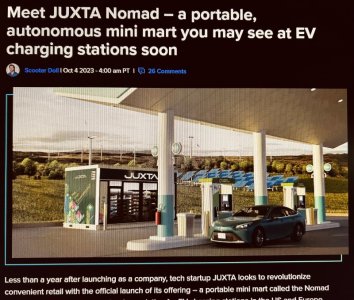Debrah N.
Senior Member
- Location
- Alberta, Canada
I think that we've come to the point as a society where waste is something we're finally conscious of. Volvo is developing EV batteries that they can recycle and reuse the copper, nickel, lithium and other parts. Mercedes Benz has partnered with a Vancouver based company to reuse their partially spent batteries in residential and industrial storage situations. This year, Nissan began powering street lights and a stadium in the Netherlands with their customers old batteries, a project which General Motors also turned to back in 2015 in their data centre. (I can provide links if anyone is interested).That doesn’t “mean” anything, except that I am not ready to make such a drastic change and take on new expenses. I have heard very little good about EV vehicles, with the exception of cleaner air. Sooner or later, the batteries are going to start piling up, yet I haven’t read of a suitable way to rid ourselves of the millions that will someday be happening. How will they dispose of them?
Just like with tires, we need to find a clean way of destroying or recycling them. ...........................
Aren’t you glad you asked the question? Sometimes, there is just no simple answer to a question, but I appreciate your inquisitiveness. It shows you are a thinker and not a complainer. Some may complain or worse, like make comments that make it personal while others think about the alternative. You obviously are a thinker.
A Swedish company called Northvalt is in the process of building a battery recycling plant while Tesla has built a plant in Nevada where batteries of old Tesla's will be disassembled and the components reused in new batteries.
As time goes by, the whole process will become even more streamlined, but the important point is, it's not being ignored. And let's not forget, gas burners also used all kinds of natural resources that must be processed and then eventually discarded/recycled. So it's not like EV's are some new product that suddenly presents us with a new problem. It's the same old problem with a different energy source. Nothing more. The benefit of them is that along the way, while we're using them, they aren't burning a product that poisons the environment.
Yes, during production, an EV has a larger carbon footprint, but by the time it's been on the road for 18 months, it's made up for that and is running with lower to no emissions depending on the source of electricity. Even cars that are running in cities where the electricity is produced by coal, are only creating half the emissions that a gas burner is. It's important too, to remember that a gas burner's emissions start long before you put your keys in the ignition. They start in the oil fields, in the processing plants, in the tanker trucks that deliver the gas to the gas station.
With roughly 282 million personal vehicles on the road in just the USA, our driving habits are significant to the problem of climate change. And that's why I asked, because our magnificent, beautiful, delicately balanced world needs humanity to change how we do the things we want to do.


